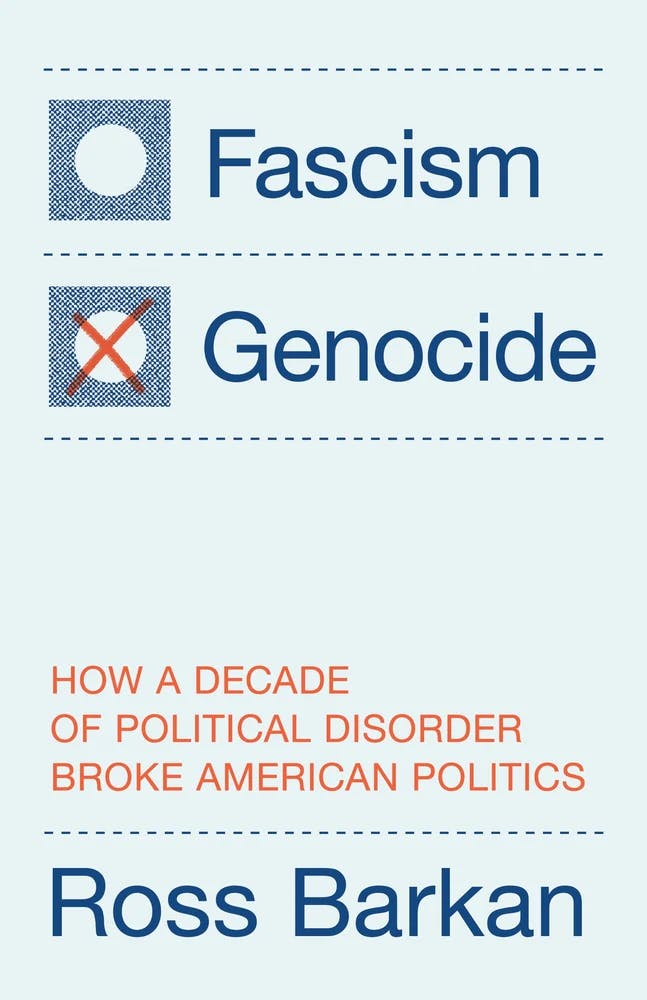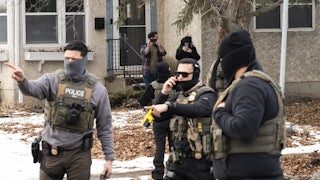Ross Barkan is a partisan for a healthy American electoral system—his political imagination and career both depend upon it. The New York magazine columnist, who’s had stints at The Guardian and The Village Voice, writes from the left, but he often provokes bleeding hearts instead of aligning with them. In 2018, he dabbled in electoral politics as a state Senate candidate, representing his native Bay Ridge, Brooklyn, with NYC mayoral front-runner Zohran Mamdani as his campaign manager; Barkan lost in the Democratic primary. He’s published three novels, including this year’s Glass Century, which spans several decades of New York history. Just 35 years old, Barkan is cut from a cloth that might disappear from the quilt of this country’s commentariat. His work, however versed in the customs of the internet, feels vintage for both its veneer of equal opportunity astringency and its literary affectations.
His new book, Fascism or Genocide: How a Decade of Political Disorder Broke American Politics, is a breathless and engrossing examination of the cardinal flaws within the Democratic Party that enabled Donald Trump’s reelection, among them the Dems’ neglect of their National Committee and their obedient support for Biden’s 2024 presidential candidacy until it was too late for Kamala Harris to run a legitimate campaign. The book is structured like a novel of ideas, in a way that can feel both thrilling and nostalgically grandiose. Barkan presents his arguments in eight brief but sweeping sections—“Social Justice,” “Israel,” and “Culture” are the titles of a few—that explode recent news events and talking points into large-scale set pieces of contemporary American political life. Remember Jamaal Bowman’s unfairly mocked reelection rally at St. Mary’s Park in the Bronx last summer? Barkan spins it into a prophecy of the country’s far-right backlash. In a chapter called “Trump,” he dives into the mind of Thomas Crooks, the would-be assassin of our sociopath in chief, as though to evoke Don DeLillo’s 1988 fictionalized life of Lee Harvey Oswald, Libra (Barkan wrote his graduate school thesis on the modern classic). He describes Trump’s swollen public persona after the July 2024 shooting:
He had fame, and the best kind, the American kind, that which, like Cronos, devoured whatever else was on this Earth, so men and women in Paris and Egypt and Kampala could think of him and dream of him and even bear his likeness, this image of the blood and the flag and the fist, on a cotton t-shirt.

His short book reveals a remarkable ability to weave large-scale narratives out of the country’s democratic mechanisms and national character, taking Crooks, for example, as one sorry failure in a line of people who almost killed presidents, a target for violence that Barkan describes as “something of a throwback”—considering that contemporary killers seem to aim for notoriety by shooting up schools, queer clubs, synagogues, and other semi-public spaces. Moments such as these swing for the fences and make contact, which is why it’s so disappointing that Barkan’s mischievous tone and persistent air of skepticism ultimately serve a blinkered concern: electing Democrats. They may be the better half of a stunningly broken two-party system, but politics does not exist purely to benefit their strategy.
Barkan uses his impishness in the service of electoral pragmatism, not idealism about how politicians can truly help their constituents. He remains an admirer of Bernie Sanders in part because the veteran senator doesn’t bend on certain issues that have consumed the progressive wing of his party during the last decade, among them a push to relax immigration enforcement and defund the police. Never mind what anyone actually thinks about either ICE raids or police abuse: Sanders, writes Barkan, knows that “you win on economic issues, and you can’t lurch too far to the left on culture.” The author’s dogged focus on the campaign trail is both cynical and confusing. In a voice of smug reasonableness and using different nouns, Barkan repackages the same old saws about how “wokeness” ruined the Democratic Party’s chances, when one might expect a book called Fascism or Genocide to prod a fresher conundrum: How has an ongoing U.S.-backed genocide in Gaza and the threat of fascism on the domestic front altered the moral landscape of being a Democratic politician in America, and how should it have? What does it mean—in terms of governing, not mere electability—that the most visible liberals in 2024 treated this terrain as entirely unchanged?
Barkan took his book’s title from an unnamed “Palestinian activist” who told the author that the 2024 election “was a brutal choice between genocide and fascism.” He doesn’t unpack this quote much; Barkan is cagey about discussing either genocide or fascism. He often hangs the former term between quotes, which softens any outrage one might detect in his prose about Israeli belligerence and suggests that accusations of war crimes primarily exist as a buzzword in American electoral discourse. Barkan is emphatically not a supporter of Israel’s status quo—he writes that a single state, in which Palestinians and Israelis share equal rights, would be realized “in a just world”—yet his treatment of Gaza is the greatest flaw of Fascism or Genocide and an alarming hole in his ideological perspective.
Barkan both consistently condemns the savagery of the October 7, 2023, Hamas attack and disavows the violence that Israel has wreaked on Palestinians since then, making clear that the response was imbalanced. But he positions Hamas’s actions as though they arose out of nowhere and not after decades of Israeli subjugation, displacement, ethnic cleansing, and untold crimes against humanity. Some people, myself included, would say that the genocide of Palestinians began at the tail end of 1947 with the Nakba—a word that does not appear in Barkan’s book—and that the 2006 election of a radicalized government such as Hamas and the attacks of October 7 were unsurprising results of a legacy of oppression. Barkan never mentions that Hamas has long been funded by the Israeli government, nor that the 2006 election, a contest that was
urged by George W. Bush, caused Israel to punish the Gaza Strip with a blockade that has led to innumerable deaths from starvation, water shortages, and lack of medical supplies, as well as the devastation of Gaza’s economy: Poverty rates had soared to 61.6 percent at the start of 2023, compared to 40 percent in 2005. Barkan quotes a conservative toll of Gazan casualties since October 7 (30,000 by the ides of March, 2024), although this figure was widely reported—long before this book went to press and even by news sources that activists deride for their bias toward Israel—as a significant undercount. “I grieve for the civilians Hamas slaughtered,” Barkan tells us. “But I grieve, too, for civilians slaughtered everywhere, and I struggle to care more about one foreign country over another.” Why not just write that he grieves also for Palestinians? What’s with this All Lives Matter prattle?
Barkan’s reluctance to engage with the specific atrocities of the genocide in Gaza is especially odd because he has a track record as a commentator of conscience. Barkan has long been a critic of the American Israel Public Affairs Committee, and he left a job at The Observer in apparent protest of its editor in chief Ken Kurson, who helped write a 2016 speech for Trump, then running for his first presidential term, to deliver to AIPAC. In a slightly older world, Barkan could align himself more comfortably with the progressive wing of the Democratic Party—at least, without constantly codifying his own politics with respect to his Jewish identity. Israel’s recent actions changed all that, and in a cringey, memoiristic chapter titled “Israel,” his irritation with this shifted discourse becomes self-pitying. Barkan wants us to know that he is not responsible for the predicament of Palestinians:
Again and again, people like me have been forced to answer for a nation that we are not bound to in any meaningful way; I have never visited Israel and I’m not sure I ever will. To ask an American Jew to account for Israel is not so different than demanding an answer from them for the ongoing crisis in Sudan.
Some anti-Zionist Jews are wary of discussing Palestinian suffering in terms of its relationship to their ethnic and religious background, yet for different reasons. My Jewish diasporic identity spurred me, years ago, to learn more about Israel’s occupation and to denounce its treatment of Palestinians, an awakening shared by many Jewish allies in the pro-Palestine movement. Still, we understand that framing a devastatingly lopsided conflict within one’s Jewish experience is to forefront a group that is already front and center. (There is no shortage of Jewish journalists in America covering Palestine, while Palestinian and Muslim journalists have lost their jobs or have been suspended thanks to the perception that they are incapable of reporting on daily slaughter without bias.) While Barkan dismisses identity politics elsewhere, here he deploys them to express how he’s been put upon as a Jew. In the end, it feels oh-so American to act annoyed when nudged to consider one’s relationship to the wider world.
“Israel” employs identity politics in a well-worn vein: Barkan invokes his ancestors and upbringing the same way that a politician would while stumping on the campaign trail. He wants to be seen as a New Yorker, a born Brooklynite, a product of migration’s towering, historical waves—Barkan believes in an intoxicating dream of opportunity and progress. He describes, denying Zionist claptrap about all Jews being able to trace their roots to Israel, his predecessors as “the Russians, the Belarussians, the Pale of Settlement Jews, the backbone of America’s first socialist wave. They streamed through Manhattan, Brooklyn, and the Bronx, remaking the new century there. They were the tailors, the garment workers, the candy store owners, the scholars, and the gangsters.” (“Their children and grandchildren wrote best-selling novels,” he continues, a bit wistfully. “Some went into politics.”) Barkan’s reverence for his Jewish diasporic heritage is transmogrified into a belief in the United States, a country that has largely shuttered itself to immigrants in the months since this book was contracted and that was already sealing its borders under liberal administrations.
Barkan’s melting-pot dreams may be why he only addresses the unimaginably real horrors of an American-funded catastrophe abroad as they pertain to the increasingly imaginary space of American democracy. On that subject too the author can feel out of step with the dire stakes of the present: “Democracy will continue to exist,” he writes with bewildering confidence: “It simply offers no promise for particular election outcomes.” This is the closest that Barkan gets to actually discussing fascism, which seems evident half a year into the second Trump administration, as masked ICE agents terrorize communities, the president ignores the rulings of federal judges, and power concentrates more and more in the executive. In a piece published in The New Statesman a day after the 2025 inauguration, Barkan claimed that the United States is simply too large and too old for fascism to become a reality. He thinks that a familiar balance will restore itself because, as he writes early on in Fascism or Genocide, “American politics and culture are more cyclical than most in the trenches will readily admit.” From the trenches, or even just with a view of them, the horror is too much to accept that the answer is to wait around until being woke is cool again.
This book infuriated me, but it also reminded me that the crafty, unpredictable, and sometimes fascinating likes of Ross Barkan could very well be threatened by this nation’s grander shift toward authoritarianism, censorship, and anti-intellectualism. Our nation needs political thinkers like Barkan who are capable of articulating ideas that exist outside of activist paradigms—as the author well knows, this is a sacred facet of democracy. Barkan lambastes the news agencies and presidential aides that tried to cover up Biden’s declining mental faculties, compares Trump’s hucksterish ability to get investors to underwrite unprofitable endeavors to that of Uber, and blames Obama for coddling the burgeoning app-scape of Silicon Valley during his administration. He describes the 2024 Republican National Convention, hilariously, as “one of the wokest places in America”:
Woke was J. D. Vance insisting it was yucky words that got Donald Trump’s skull nearly blown open. Woke was Kellyanne Conway boasting about all the women Trump had promoted during his campaign. Woke was treating Israel as an oppressed identity category. Woke was whining about the state of high school and college female sports.
What Barkan’s writing does best is upend expectation, with barbed prose that pierces in unanticipated places. He jostles loose politically correct groupthink, whether that of MSNBC or Democracy Now!, and forces his readers to consume political rhetoric with a healthier dose of doubt. But are the pieties of leftist causes worthwhile punching bags today, comparable to opportunistic media entities and bad-faith government officials? You get the sense that Barkan can’t help but push back on the activist vanguard and that he hasn’t thought deeply about whether they deserve his contempt. Fascism or Genocide isn’t an evenhanded, clear-eyed view of the political present but instead the performance of one. Politics is the material with which a stylish writer establishes his independence on the page.










